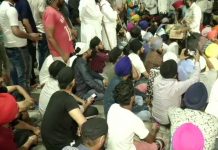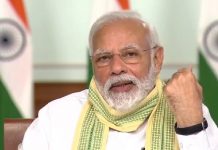
The success of Rahul Gandhi’s padyatra and the grand old party’s good showing in the recent Assembly elections seems to have sparked a rethink among the DAP leaders who had thrown their weight behind Azad after he decided to part ways with the Congress, reports Riyaz Wani
Almost two months after former Congress leader Ghulam Nabi Azad formed his own party in Jammu and Kashmir, he is finding it difficult to keep the flock together. On December 22, Azad expelled three senior leaders for anti-party activities, with Tara Chand, former J&K Deputy Chief Minister, among them. Other two are Dr Manohar Lal and Balwan Singh.
Tara Chand was considered a confidant of Azad and he was the first senior Congress leader who had announced his support to Azad when he floated his party. Chand is reportedly returning to the Congress and tipped to join Rahul Gandhi’s padyatra when it reaches the union territory.
Soon after being expelled, Chand alleged that Azad’s new party is “dividing secular votes” in Jammu and Kashmir.
There are rumours that the other Congress leaders who had joined Democratic Azad Party are also deserting. Around 50 Pradesh Congress Committee members had left the Congress to join Azad. If this happens, it will unravel the fledgling party which was shaping up to be a viable opponent to the BJP in the region. And this could leave Azad crippled as a leader striking out on his own.
Analysts see the rethink among the DAP leaders as the outcome of some rejuvenation in the Congress party brought about by Gandhi’s padyatra. This is believed to have enthused the party’s rank and file across the country, including in the union territory. Besides, Congress good showing in the recent Assembly elections has also offered some hope, albeit, it was overshadowed by the BJP’s landslide victory in Gujarat.
Where does Azad go from here? There are no easy answers. With the centre apparently reluctant to hold Assembly elections in the UT in the near future, it will be difficult for the former veteran Congress leader to keep his party together. More so, if they sense that the DAP is generating less than expected public response.
The DAP has still senior leaders such as Taj Mohiuddin, Ghulam Mohammad Saroori, Pirzada Mohammad Sayeed, and the like in its ranks. This is expected to enable the DAP to make deep inroads into the constituencies of the other parties, particularly the Muslim vote bank in the Jammu division which may or may not go to the advantage of the BJP in the future Assembly election whenever these are held.
However, it is too early to say that Azad’s loss of three senior leaders will be a gain for the Congress, albeit Tara Chand can boast of some following in the Jammu region. It is also true that sans Azad, the Congress has been left without any identifiable support base. More so, in Jammu region where Azad’s following straddles the Hindu-Muslim divide.
Let alone not being charismatic, Congress’s new J&K president Viqar Rasool is known to be a political lightweight. He isn’t a mass leader unlike some of the leaders in the regional parties such as the National Conference and the PDP. Nor is his predecessor Ghulam Ahmad Mir or anyone else.
This has hobbled the party in the union territory. Making things worse, Congress in the UT has no engaging political narrative to draw support from the public. Its position on the revocation of Article 370 remains ambiguous. It supports the revocation of Article 370 but not the manner of doing so, something that has alienated its followers in Kashmir. It has also singularly failed to put the spotlight on the BJP’s failures in the UT.
But so hasn’t Azad’s party. After some show of strength around the time of the launch of the DAP, Azad has failed to maintain the political momentum to keep his support base energised. Nor has he spelt out any coherent political narrative. For example, his stance on Article 370 also remains vague.
“Azad needs to articulate a credible and exciting politics to rally people around his party,” said Naseer Ahmad, a columnist. “Without that, he will become synonymous with Congress and meet its fate.”
AAP’s entry
Bolstered by its landslide victory in Punjab, Aam Aadmi Party is making forays in other states of the country in its bid to become a national party. Jammu and Kashmir is one of them. It has already qualified for the status of a national party by winning six seats in Gujarat. And over the last year, the party has been trying to expand its footprint in the union territory, both in Kashmir Valley and the Jammu region. What is more, its message is resonating among some sections of people, more in Jammu than in Kashmir.
The party has sought to rally people around the issues of youth, education, health, power and water.
Earlier also the party has tried to set up a base in the then state of J&K but didn’t get much traction. The party later gave up on the project. But this time it has become serious with the Punjab victory putting wind in its sails. The party says it wants fresh faces in the union territory to carry its political message.
The emergence of the AAP as a major political force in the country with its triumph in Punjab and a reasonable performance in Gujarat has created a buzz. Though the party led by Delhi Chief Minister Arvind Kejriwal has still a long way to go before it could emerge as a credible rival to the BJP, the party seems to offer a sort of new politics that has been effective against that of the saffron party.
But in Kashmir, politics has never been about sadak, paani and bijli. The ideology and the position on the lingering conflict in the region is also important. And after August 2019, a party’s stance on the revocation of Article 370 impacts its electoral chances in the union territory.
In Kashmir Valley also, the AAP is likely to be hamstrung by its position on the revocation of Article 370 in August 2019. Kejriwal’s party was the first to support withdrawal of the constitutional position in Parliament which was something that shocked people in Kashmir who earlier looked up to his politics with admiration. Kejriwal didn’t even oppose divesting J&K of statehood and downgrading it into two union territories. This is so even when he has been seeking statehood for Delhi.

There is, however, a chance that the AAP’s politics will appeal to the voters in Jammu who over the last two years have developed some degree of disaffection with the BJP’s policies. While the Hindu majority province has welcomed the erasure of J&K autonomy, the people are deeply apprehensive about the loss of land and businesses to outsiders who are now eligible for a domicile status. Should the AAP succeed in building a significant presence for itself in the run up to the anticipated assembly polls, it won’t be a good news for the BJP which is hopeful of sweeping the province to retain its political dominance in the UT.
What will eventually happen in the assembly polls in the UT can be anybody’s guess. The political scene in J&K has already become very crowded with the advent of the DAP, Apni Party of industrialist-turned-businessman Altaf Bukhari and the entry of the AAP. The fate of Azad’s party following the expulsion of three key leaders would certainly be a distinct political factor in Jammu division.













